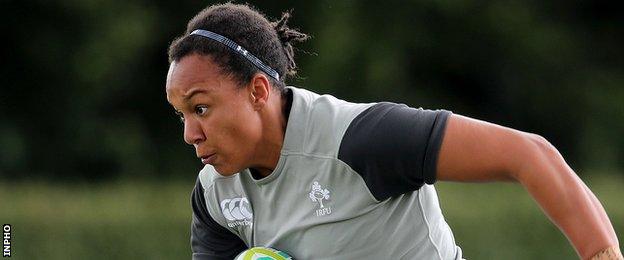Elite sportswomen survey: Menstruation cycles must be considered - Sophie Spence
- Published
Menstruation impacts performance - former international Spence
Former Ireland rugby international Sophie Spence has said that more attention needs to be paid to menstruation cycles in women's sport.
Spence, who played in two World Cups, believes having more women in coaching roles would help.
The 33-year-old was speaking to Sportsound Extra Time following the launch of findings from a major BBC Sport survey of women's sport.
"Menstruation cycles completely affect your performance," she said.
"Only females understand that as much. It is a huge thing and it comes down to more females being involved at a certain level for performances to peak even more within athletes.
"If you are a female in a female sport but are surrounded by men being your coaches then their understanding is a lot different because they do not experience what you are experiencing.
"If you have a female in the squad to link in with coaches and advise then that would be a huge thing."
'Almost seen as an excuse'

Spence has started her own business in Wales since retiring as a rugby player
The UK-wide BBC Elite British Sportswomen's Survey was sent to 1,068 women in 39 different sports and received 537 responses.
It saw some women speaking out about issues such as "horrific abuse" on social media, constant comments on their appearance and sexist remarks questioning their right to play sport.
Continuing on the topic of menstruation, Newcastle-born Spence, who is currently coaching a men's team in Wales, said it impinges on training and performance levels.
"In terms of people understanding what your bodies are going through at the time of the month, I remember fitness testing and your scores are lower," said Spence,
"Or you are going into camp and feel rough but are expected to fitness test. There are reasons why you would not be hitting those targets, but it is almost seen as an excuse, or that what you are feeling doesn't really matter."
Rugby is 'a sport for all'
Part of an Ireland squad that won a Grand Slam and two Six Nations titles, Spence retired from playing in 2018.
She said she was comfortable talking about being a black, gay woman and insisted that racism, another topic discussed in the study, was not something she struggled with in rugby.
"I got married last year and am comfortable in who I am, but may not have been this comfortable to everyone else five years ago," she added.
"Until people are comfortable enough to be open, that is when we will see changes. I have definitely been surrounded by people who have kept quiet and they have the right to do that.
"The beauty about rugby is that it is a sport for all and I can honestly say that I am lucky enough not to have not experienced that [racism]."
To hear the whole Sophie Spence interview and more about the BBC Sport survey, click here to listen to this week's Sportsound Extra Time.